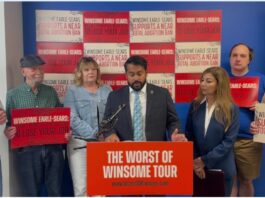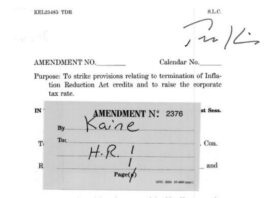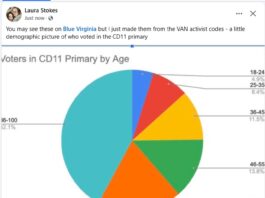![]() A word from Third Eye Strategies Principal Stephen Clermont on the difference between the results of the recent Quinnipiac poll and the Virginia Bellweather Poll:
A word from Third Eye Strategies Principal Stephen Clermont on the difference between the results of the recent Quinnipiac poll and the Virginia Bellweather Poll:
In the Quinnipiac poll, just 25% of voters said that heard anything about the regulations on abortion providers. With so few people following the debate, question wording is essential since this is how most voters will have gotten any information. Quinnipiac framed the followup questions two ways. The approval one is framed on giving voters information on building code changes, relatively non controversial. It is worth noting that among those who heard about this issue, opposition is much higher than among those whose only information comes from this question (51% approve-41% disapprove among those who have heard about this versus 57%-16% among those who have not).
In the question about the regulations being necessary, Quinnipiac frames this as one side supports these changes as they safeguard women’s health versus the other side opposing them, saying that these are an effort to force clinics out of business. It is again worth noting that among those who heard about this issue, a majority say these changes are not necessary (51% unnecessary versus 43% necessary) as opposed to 53% necessary-28% not necessary among those who have not heard anything about this.
Our poll framed this issue differently.
We state that opponents of these changes say that clinics are already safe and closely regulated by the state (true facts) and that these regulations are a backdoor way to outlaw abortion services. This is a different frame than safety vs. closing clinics. It is safety vs. already safe/outlawing abortion. The added information that the clinics are safe and regulated balances out the other side saying these greater government regulations are needed for safety. In our bellweather districts, 44% agree with opponents of the law and just 38% with supporters. Voter education will be essential for both sides of the debate as this is all new information to 75% of the state’s voters.
A couple of other points, we interviewed likely 2011 voters compared to Quinnipiac’s universe of registered voters. Since responses to these questions are so dependent on how closely voters follow the issue, those most likely to vote in a state election like this are more likely to be following this issue. Also, in the northern Virginia region of the Quinnipiac poll, voters are split on the necessity of this law with 43% saying it unnecessary compared to 41% deeming it necessary.



